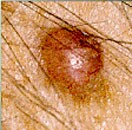- Could Your Grocery Store Meat Be Causing Recurring UTIs?
- Are You Making This Expensive Thermostat Error This Winter?
- Recognizing the Signs of Hypothyroidism
- 10 Strategies to Overcome Insomnia
- Could Artificial Sweeteners Be Aging the Brain Faster?
- Techniques for Soothing Your Nervous System
- Does the Water in Your House Smell Funny? Here’s Why
- Can a Daily Dose of Apple Cider Vinegar Actually Aid Weight Loss?
- 6 Health Beverages That Can Actually Spike Your Blood Sugar
- Treatment Options for Social Anxiety Disorder
Painful, Itchy Patches Could Be Sign of Skin Cancer


Painful or itchy skin lesions could be a warning sign of skin cancer, researchers report.
“Patients sometimes have multiple lesions that are suspicious looking, and those that are itchy or painful should raise high concerns for non-melanoma skin cancers,” study author Dr. Gil Yosipovitch, chairman of dermatology at Temple University School of Medicine, said in a Temple University Health System news release.
Researchers looked at the medical records of 268 patients who were confirmed to have skin cancer lesions between 2010 and 2011. The patients were treated at Wake Forest University Baptist Medical Center and had almost 350 lesions in total.
The patients answered questions about the levels of pain and itchiness in their lesions. More than one-third of the skin cancer lesions itched, according to the study. Just under 30 percent were painful. Many people reported that their lesions were both painful and itchy.
Melanoma lesions were the least likely to be painful or itchy. Other skin cancers, especially basal cell carcinoma and squamous cell carcinoma, were more likely to be itchy or painful, the findings showed. Melanoma is much less common than basal cell and squamous cell skin cancers, but it is far more dangerous, according to the American Cancer Society.
“The study highlights the importance of a simple bedside evaluation for the presence and intensity of pain or itch as an easily implementable tool for clinicians in evaluating suspicious skin lesions,” the study authors wrote.
Yosipovitch hopes the study will encourage the development of a ranking scale to help doctors use the symptoms of pain or itch — or both — to figure out whether patients have skin cancer.
The study appears in the July 23 issue of JAMA Dermatology.
More information
For more about skin cancer, visit the U.S. National Cancer Institute.
Source: HealthDay
Copyright © 2026 HealthDay. All rights reserved.










